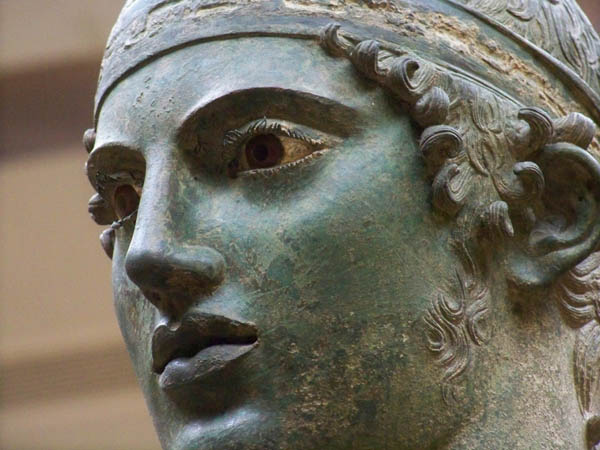Translated by Natasha Bershadsky
Hippolytus and Phaedra
To Gregory Nagy
narration
Hippolytus, young, beautiful and modest, son of Theseus and some Amazon, was devoted to Artemis, scorning Aphrodite. The offended goddess of love inspired in Phaedra, his stepmother, a vehement passion for him: she used to go from Athens to Troezen, hiding herself behind a myrtle tree and peeking at him during his athletic exercises; and as the desire was driving her insane, she kept piercing the myrtle leaves with her hairpin. But Hippolytus preferred to stay faithful to the goddess of purity and to the filial respect for his father, and rejected Phaedra’s love. She, in fear of her passion becoming known to Theseus, and with her love turning into hate, accused Hippolytus of having attacked her to violate. Blinded by the anger at his son, Theseus asked Poseidon for his death. Phaedra, once she realized what she had done, hanged herself in her royal chamber; and as she was hanging, she passed to the underworld, still to sway and to plead.
song
Love hasn’t taught you to change The guilt of beauty into the beauty of guilt; and if I challenge you, you hold back from drinking out of the spring for fear of getting wet. Hippolytus, Hippolytus, a complete hypocrite. I’m piercing the leaves, the myrtle-leaves, like the body, like the heart, that the desire pierces; illicitly, I know, I love you illicitly, insanely, absurdly, darkly. You egoist, you narcissist, Your death has started off. “The rejection of love kills” I’ll write, I’ll cry before I meet you in the void. I was a pawn of Aphrodite, And you of Artemis, that’s why we both got trapped. Hippolytus, come back to light, for another woman, be dazzling.
Ιππόλυτος και Φαίδρα
Στον Γκρέγκορυ Ναζ
αφήγηση
Ο Ιππόλυτος, νέος, ωραίος και σεμνός, γιος του Θησέα και κάποιας Αμαζόνας, αφοσιωμένος στην Άρτεμη, περιφρονούσε την Αφροδίτη. Θιγμένη η θεά του έρωτα, ενέπνευσε στη Φαίδρα, τη μητριά του, παράφορο πάθος για κείνον: πήγαινε από την Αθήνα στην Τροιζήνα, κρυβόταν πίσω από μια μυρτιά και τον κρυφοκοίταζε που γυμναζόταν, κι όπως την τρέλαινε η πεθυμιά, τρυπούσε τα φύλλα της μυρτιάς με τη βελόνα των μαλλιών της. Ο Ιππόλυτος, όμως, προτίμησε να μείνει πιστός στη θεά της αγνότητας και στον υιικό σεβασμό προς τον πατέρα, και απέκρουσε τον έρωτα της Φαίδρας. Εκείνη, από το φόβο πως θα την αποκάλυπτε στον Θησέα, και με την αγάπη της να έχει γίνει μίσος πια, κατηγόρησε τον Ιππόλυτο ότι της είχε επιτεθεί να τη βιάσει. Τυφλωμένος από θυμό για τον γιο του ο Θησέας, ζήτησε από τον Ποσειδώνα τον θάνατό του. Η Φαίδρα, μόλις συνειδητοποίησε τι είχε κάνει, κρεμάστηκε στο βασιλικό της δώμα, και κρεμασμένη πέρασε στον κάτω κόσμο, να αιωρείται ακόμα και να παρακαλεί.
τραγούδι
Δε σ’ έμαθε ο έρωτας ν’ αλλάζεις την ενοχή της ομορφιάς με ομορφιά της ενοχής· κι αν τόλμησα εγώ, εσύ διστάζεις απ’ την πηγή να πιεις νερό γιατί φοβάσαι να βραχείς. Ιππόλυτε, Ιππόλυτε υποκριτή απόλυτε. Τα φύλλα τα μυρτόφυλλα τρυπάω σαν το κορμί, σαν την καρδιά που τα τρυπάει η πεθυμιά· παράνομα, το ξέρω, σ’ αγαπάω παράνομα, παράφορα, παράλογα και σκοτεινά. Εγωιστή και νάρκισσε, ο θάνατός σου άρχισε. «Η άρνηση του έρωτα σκοτώνει» θα γράψω, θα φωνάξω πριν συναντηθούμε στο κενό. Της Αφροδίτης ήμουνα το πιόνι, της Άρτεμης εσύ, γι’ αυτό παγιδευτήκαμε κι οι δυο. Ιππόλυτε, γύρνα στο φως κι ας γίνεις γι’ άλλην όμορφος.
The Charioteer
The Charioteer: the gaze. A pair of omniscient eyes. I am not I wasn’t in the chariot of the gods. I chomp on my bit for centuries chewing chthonic voices and laurels of silence. The Charioteer: the gaze.
Ηνίοχος
Ηνίοχος τα μάτια. Οι παντεπόπτες οφθαλμοί ζευγάρι. Δεν είμαι δεν ήμουν στο άρμα των θεών. Δαγκώνω τη στομίδα μου αιώνες μασώντας φθόγγους χθόνιους και δάφνες της σιωπής. Ηνίοχος τα μάτια.

